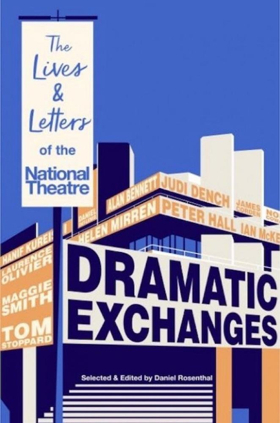Book Review: DRAMATIC EXCHANGES, ed. Daniel Rosenthal

This fascinating tome offers an insider's history of the National Theatre, via some 800 letters exchanged between Artistic Directors, actors, directors, playwrights, politicians, agents, critics and more. From arcane trivia through to vigorous words on the very nature and purpose of drama, it's a theatre geek's must-have.
Editor Daniel Rosenthal chose these exchanges from around 12,000 archival treasures, and it's a well-rounded selection - variety in voices, situations and tone, long letters through to snappy telegrams, as well as a chronological sweep. It's divided into AD eras: Laurence Olivier, Peter Hall, Richard Eyre, Trevor Nunn, Nicholas Hytner, and Rufus Norris.
That structure offers an interesting compare and contrast in leadership styles, from Olivier's imperious rule through to Norris's self-description as "a totally collaborative practitioner". You can also track the development of modern drama through the works involved and how they're approached - as well as glimpsing backstage politics, feuds, and what-might-have-been losses.
The latter are particularly fascinating, reading about a Crucible that nearly starred Sean Connery, Frankie Howerd considered for The National Health, Rex Harrison proposing The Rape of the Sabine Women, or Kenneth Tynan imploring Paul McCartney to write music for As You Like It (turns out the Beatle wasn't a Shakespeare fan). Not to mention the National sniffing around Harry Potter as early as 1999.
Many of the anecdotes humanise great names, and will likely offer solace to budding thespians. Ever felt bad about how an audition went? Here's now Dame Eileen Atkins, imploring Olivier to give her a second go at trying out for Ophelia. (No luck.) And even John Osborne apparently struggled to score NT house seats - whilst declaring war on the critics.
There's a fine line between professional and personal throughout, underscoring this as a passion profession. Olivier takes great offence at Ian McKellen turning down a contract, while, in turn, Maggie Smith seems genuinely heartbroken when 'Larry' gives away a part he'd promised her.
The book also demonstrates that griping about the National in fact began before the building ever existed - and has continued throughout its existence. From Hall imploring Olivier not to divert talent from Stratford to heads of other theatres publishing an open letter about its potential to hoover up Arts Council funding, the institution has always been under fire. Trouble comes from within, too, via a workers' strike or technical nightmares.
At least some impediments have been permanently removed, like the Lord Chamberlain's office; reading about their snotty interference with Charles Woods' Dingo make the blood boil. Conversely, we glimpse the insightful interventions of great ADs and literary managers - see: Tynan's ruthlessly efficient dismissal of a lesser Tennessee Williams play.
Nick Hytner and (the perennially self-doubting) Alan Bennett's is probably the most endearing director/writer relationship, even as Hytner suggests firm cuts of The History Boys. We see that dynamic sour, too, as when Peters Hall and Shaffer fell out over the former not being given the opportunity to direct the film version of Amadeus.
There's also an illicit thrill in glimpsing the personal style of address of these icons - who knew Judi Dench was so partial to all caps and underlining? Of course, some of the luvvie twirls and "darling"s in other epistles are less revelatory...
Also unsurprising is the narrow range: those making decisions are inevitable male, white, well-educated and middle-class. Several times, female playwrights' work is considered and rejected (Pam Gems can't catch a break); female creatives or those of colour barely feature; and the first-name-basis intimacies of this world make it feel at times like a private members' club.
On the cheerier side, it's heart-warming seeing how these artists inspire one another - like Nick Hern and Mike Nichols raving about Pinter's Betrayal, or Stoppard praising Patrick Marber for his Closer. Olivier describes his delight in directing Arthur Miller's The Crucible thus: "I feel like a young chap in love."
Thrilling, too, seeing a great work come together. The articulate, thoughtful, candid and funny exchanges between Lucy Prebble and Rupert Goold about The Effect are joyful, as are those between Mark Haddon and his Curious Incident team, particularly Simon Stephens.
Overall, there's a wonderful sense of collective creative endeavour, even with all the bumps in the road - and occasional moments of sheer luck. It also illustrates the impossible task the National has to be all things to all people: populist, keeper of tradition, pioneering and avant-garde; a successful leader, but not at the expense of others' growth; a perfect reflection of a nation suffering identity crisis.
But, despite that daunting prospect, the passion lives on. This invaluable collection, as well as providing a wonderful reference text and guide, will no doubt inspire another wave of practitioners setting their sights on this unparalleled institution.
Dramatic Exchanges: The Lives and Letters of the National Theatre, selected and edited by Daniel Rosenthal, is published by Profile Books and available now
Reader Reviews

Videos

